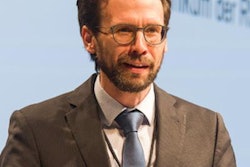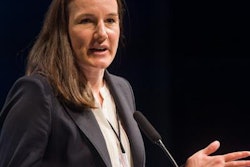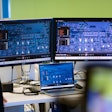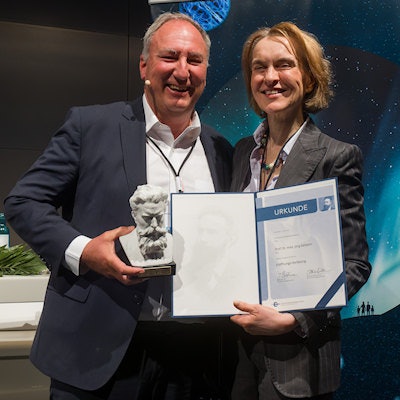
Radiologists in Germany are in upbeat mood after an overwhelmingly positive first day at the 104th German Congress of Radiology, RöKo 2023. The meeting is being held in Wiesbaden from 17 to 19 May under the presidency of breast imaging pioneer Prof. Christiane Kuhl.
"The opening day was simply amazing. We had a full house and an enthusiastic audience," she told AuntMinnieEurope.com on 18 May.
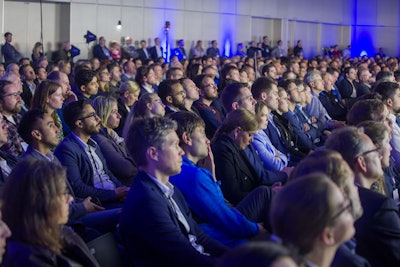 More than 4,000 onsite registrants turned up on the first day of RöKo 2023. There are also an estimated 5,000 online attendees. All photos courtesy of Deutsche Röntgengesellschaft (DRG) and Thomas Rafalzyk.
More than 4,000 onsite registrants turned up on the first day of RöKo 2023. There are also an estimated 5,000 online attendees. All photos courtesy of Deutsche Röntgengesellschaft (DRG) and Thomas Rafalzyk.Kuhl said the motto of RöKo 2023 ("Abenteuer Forschung," or "Adventurous Research") reflects her own longstanding passion for science in radiology and the fact that research is vital for every medical discipline to survive.
"Research is an adventure, because you never know where it will lead and how it will end. If you have the courage to go for it and understand that setbacks and failure are just part of the game, then something really big can happen," she added.
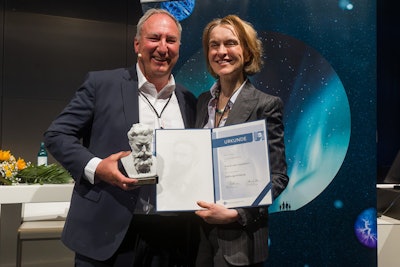 Boom or bust: Prof. Christiane Kuhl, a member of AuntMinnieEurope.com's editorial advisory board, presents a certificate and award to Prof. Jörg Debatin during the opening session.
Boom or bust: Prof. Christiane Kuhl, a member of AuntMinnieEurope.com's editorial advisory board, presents a certificate and award to Prof. Jörg Debatin during the opening session.For Kuhl, the highlight on day 1 was the opening session about AI, called "Natürliche Intelligenz versus Künstliche Intelligenz," or "Artificial Intelligence versus Natural Intelligence."
Prof. Jörg Debatin, who co-chaired the AI session, said there were four central messages to come out of Wednesday's session:
- Radiologists need AI to meet the challenges of modern healthcare and provide the best in personalized medicine for patients.
- While radiologists should be quick to embrace AI applications to provide better outcomes for patients, it is equally important to understand the limitations of this emerging technology. "This is a dynamic process requiring continuous adaptation," Debatin said.
- AI will alter the mix of skills underlying our definition of human intelligence. "We need to be open to this -- everyone in their own personal environment," he added.
- AI will have an impact on all of medicine. "Since radiology has a great track record regarding the continuous integration of innovations, it will undoubtedly also be at the forefront of shaping the AI future," Debatin stated.
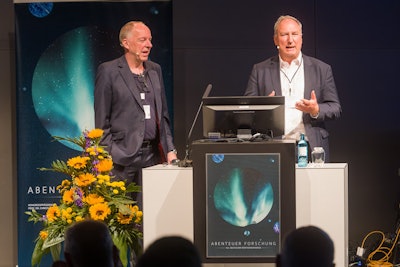 Double act: Profs. Debatin and Forsting in full flow at the opening session.
Double act: Profs. Debatin and Forsting in full flow at the opening session.Debatin, who was chair of the Health Innovation Hub for the German Federal Ministry of Health until 2021 and formerly vice president and chief technology and medical officer for GE HealthCare, said he really enjoyed working again with Prof. Michael Forsting, head of radiology and the Institute for AI in Medicine at the University Medical Center Essen. Debatin and Forsting helped build up the radiology department in Essen from 1998 to 2003.
"He was head of neuroradiology, and I led general radiology. We joined forces and were the first to fully embrace PACS and created the first paper-free and film-free radiology department in Germany in the year 2000," Debatin said.
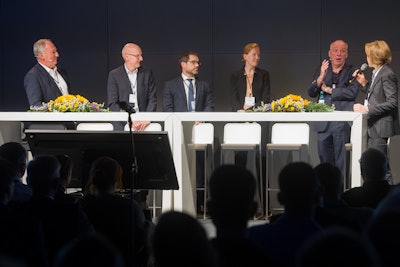 The panel discussion on AI included (from left to right) Prof. Debatin, Prof. Jörg Barkhausen, Prof. Konstantin Nikolaou, Prof. Bettina Baessler, Prof. Forsting, and Prof. Kuhl.
The panel discussion on AI included (from left to right) Prof. Debatin, Prof. Jörg Barkhausen, Prof. Konstantin Nikolaou, Prof. Bettina Baessler, Prof. Forsting, and Prof. Kuhl.RöKo is "a great meeting with an interesting program and a positive mood," Debatin added. "German radiology is alive and kicking. Christiane Kuhl and her team did a good job with engaging online contents and a strong in-person program. The record attendance reflects their excellent work."
These sentiments were echoed by Dr. Daniel Pinto dos Santos from the University Hospitals of Cologne and Frankfurt.
"RöKo -- now in the second post-COVID year -- is starting to feel again like before the pandemic," he said. "It's the best place to meet and network with others from the German radiological community."
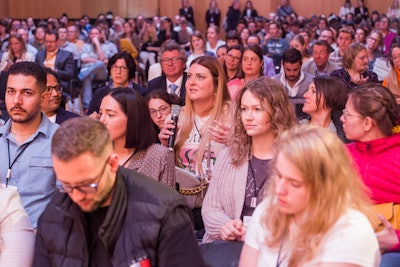 The organizers are keen to encourage interactivity and open discussion at this year's meeting, which is being held at RheinMain Congress Center.
The organizers are keen to encourage interactivity and open discussion at this year's meeting, which is being held at RheinMain Congress Center.The DRG's young forum is "super active" and has organized fine sessions on the future of radiology, how to improve the workplace environment, and career development.
"It's excellent that RöKo aims to increase its international visibility and provide a bit more time and space between sessions to network, because that's what congresses need to be about. Through COVID, we learned that many of the scientific and teaching activities can be done virtually, but nothing compares to meeting people and connecting with them on a personal level."
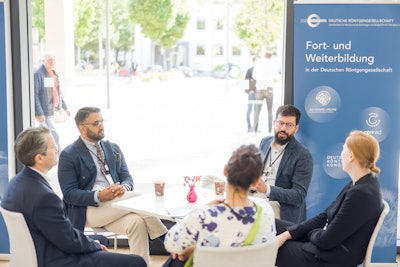 Brains trust: Martin Völker (head of science, promotion of young talent, and certification at the DRG, shown on left of photo) met on day 1 with Dr. Saif Afat, Ulrike Schiedt, Dr. Daniel Pinto dos Santos, and Prof. Baessler.
Brains trust: Martin Völker (head of science, promotion of young talent, and certification at the DRG, shown on left of photo) met on day 1 with Dr. Saif Afat, Ulrike Schiedt, Dr. Daniel Pinto dos Santos, and Prof. Baessler.RöKo is a little like "a class reunion," commented Dr. Saif Afat, an attending radiologist at the University Hospital of Tuebingen.
"It is lovely to meet with my German radiology family! For me it is very special," Afat said, who this week hopes to be elected congress president for RöKo 2026.






